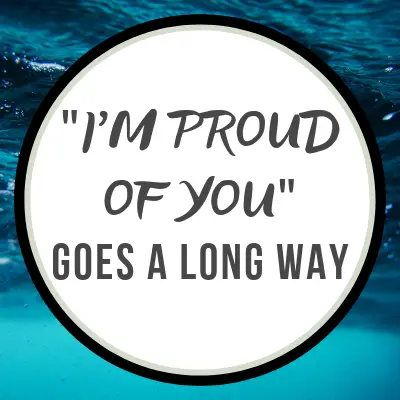It’s almost the New Year and that means taking a moment to consider your New Year’s resolutions. Don’t have any ideas yet? Or struggle with keeping your resolutions throughout the year?
Related article: How to be a Good Swim Parent
Consider some of the following New Year’s Resolutions for Swim Parents! They might not be easy for you, but they’re something every swim parent can work on throughout the year.
Disclosure: This post may contain affiliate links, meaning I earn a small commission at no cost to you if you purchase something through one of my links. As an Amazon Associate, I earn from qualifying purchases. Please check out my disclosure page for more information.

New Year, New Swim Parent
Volunteer at Meets
We all know the call for timers just before a meet starts. That awkward moment where parents refuse to look at each other in hopes that another parent will take one for the team.
And I get it. You’re at a swim meet to watch your child swim. Not sit behind the blocks and do nothing. Except, what would you be doing up in the stands while you wait for your child to swim?
Related article: Swim Meet Etiquette for Parents
Volunteers make meets run on time and efficiently. And it takes very little effort on your part to go sit for a bit and help out. Even when your child does race, you can still cheer and watch them.
Only now, you get to do so from on the deck and during the action.
Every swim parent should make a New Year’s resolution to time for at least 2-4 meets each season.
In doing so, you get to understand how much hard work goes on behind the scenes. And you get a front-row seat to the meet.
Lastly, you’re only hurting your swimmer when you refuse to time and the meet is delayed. So if nothing else, do it for the sake of your swimmer!
Resolve Not to be Over-Involved
There’s a fine line between being involved with your child’s swimming and being over-involved.
It’s not to say that you can’t (and shouldn’t) support your swimmer and cheer like mad for them. But it can cross a line. When swimming is all you start to talk about with them and you’re always looking up meet results, it’s time to step back.
Your child is more than just their sport. Just as they don’t need swimming on the brain 24/7. If they want to know how their competition is doing, they’ll look it up themselves.
Related article: 8 Things Every Swim Parent Should Know
Doing so hinders their independence. And it can also lead to anxiety if you constantly keep bringing up the sport.
Instead, be honest with yourself and take a good look at how you deal with the sport. If you find that swimming is all you want to talk about, scale it back a bit.
That’s not to say that you can’t ever talk about it. Or that you should quit cold turkey.
Instead, ease back to find that good medium. It won’t happen overnight and it’s okay if you slip up. No one is perfect 🙂
Don’t be Under Involved
Much like the earlier resolution, but the opposite this time! There’s a fine line in being involved and being under involved in your child’s swimming.
Swimmers can feel annoyed when their parents get too involved. But they can also feel hurt if their parents aren’t involved at all. A basic understanding of swimming can go a long way to understanding what your swimmer does.
If you’ve never taken some time to understand the sport or cheer on your child, try making it your New Year’s resolution this year! As swim parents, you don’t have to dedicate every waking minute to swimming.
Related article: Things You Learn as a New Swim Parent
But you should take some time to know a little bit about it. Know the names of your swimmer’s teammates. And support them even during the rough periods.
Not only will it make your swimmer feel good (no matter their age), but it’ll make you feel good, too!
Provide Healthy Encouragement
Swim parents want the best for their swimmers. And they want their swimmers to be the best.
Some parents though will get so focused on their swimmer being the best that they tend to be critical instead of supportive.
Related article: How to Create Healthy Habits for Swim Parents
Look, a swimmer knows when they had a bad meet or race. Their coach knows it and their teammates know it. They don’t need you as the parent rubbing it in their face.
Successful swim parents know when they shouldn’t press the subject. Or in this case, a race or meet.
Make this year’s New Year resolution to provide more support and encouragement to your swimmer.
If they had a bad meet or race, don’t belittle them about it and demand to know what happened. Trust me, they’ve already replayed it over in their minds a dozen times. And they’ve talked to their coach a dozen times, too.
They don’t want to hear it from you, too.
Instead, stay positive in your conversation. Let them know that there’s always next time. Or that it’s okay if they didn’t do well. It’s not the end of the world.
And sometimes, no words are the best words. Sometimes just silence and quiet comfort are all a swimmer needs.

Don’t be the Coach
For some swim parents, this is challenging. People on the outside always believe they have a better way of doing things, despite never swimming themselves.
And even if you swam competitively previously, the sport changes and evolves.
That said, unless you’re actually a swim coach, make it your resolution this year to not be the swim coach.
Telling your child how they should swim undermines the coach’s authority. And also runs the risk of confusing your swimmer if the instructions contradict.
More Content for You: Ultimate Guide for New (and Current!) Swim Parents
Now, there’s nothing wrong with asking the coach a question when you have coaching ideas. They’ll either say it’ll work or it won’t. And then let you know why.
But this year, a good New Year’s resolution for swim parents is to take a step back and don’t play coach.
Listen to Your Swimmer
Lastly, make the resolution to listen to your swimmer.
So many times I hear swimmers tell their parents how they feel about something. Only for the parent to ignore it or dismiss it completely.
And I get it. Sometimes a swimmer will say things to get out of practice. If that’s the case, dig deeper and really find out the reason why. Maybe they’re having issues with a teammate or the coach.
Or maybe they just don’t want to swim anymore and don’t know how to tell you.
It’s not at all uncommon for a swimmer to feel anxious about telling their parents they don’t want to swim anymore. And sometimes they do tell their parents. But the parents don’t listen and keep pushing them to practice.
More Content for You: 5 Reasons Why You Shouldn’t Stay at Your Child’s Swim Practice
Just as some swimmers try to tell their parents to stop being overbearing in the sport. To stop talking about it because it gives them anxiety.
It’s more common than you’d think. I hear it frequently around the pool and from swimmers.
Not listening to your swimmer can lead to them hating the sport. Take a moment to listen to what they have to say. You might not have to do what they ask, but you can compromise. Find a solution that works for everyone.
In Closing
New Year’s resolutions don’t have to be life-changing or difficult. As swim parents, making the resolution to make changes in how you approach the sport can have a lasting impact. Not just on you but also your swimmer.
As always, to happy swimming!
Chevron
Bonus Content:
How to Make Your Swimmer’s Practice a Success: How do you ensure that your swimmer has the best practice possible? And how do you fit into that role? Tips for you as a swim parent to help guide and encourage your swimmer to success at practice.
8 Things Every Swim Parent Should Know: There’s a fine line between being supportive and overbearing. As a swim parent, you need to learn how to find that balance.

Want to Improve at the Pool?
Join swimmers and swim parents to receive my free newsletter and receive a free Swimming Glossary e-book as a thanks!
Every month you’ll receive tips and coaching to help you find success at the pool.
About

Chevron is a current competitive swimmer with almost 20 years of experience in the pool. And although she fell into the sport by accident in her high school years, she still trains daily and competes throughout the year. She’s committed to providing guidance to all levels of swimmers and believes that everyone should know how to swim.